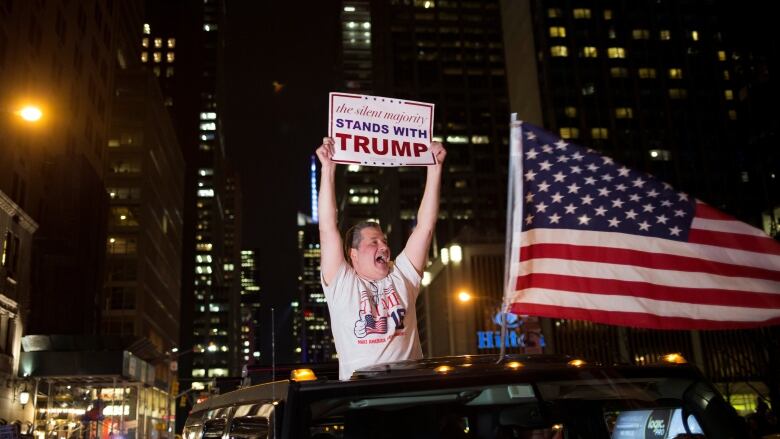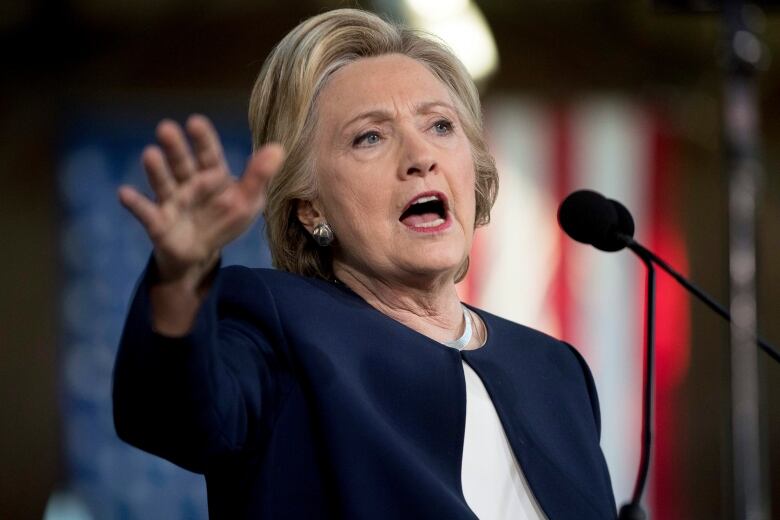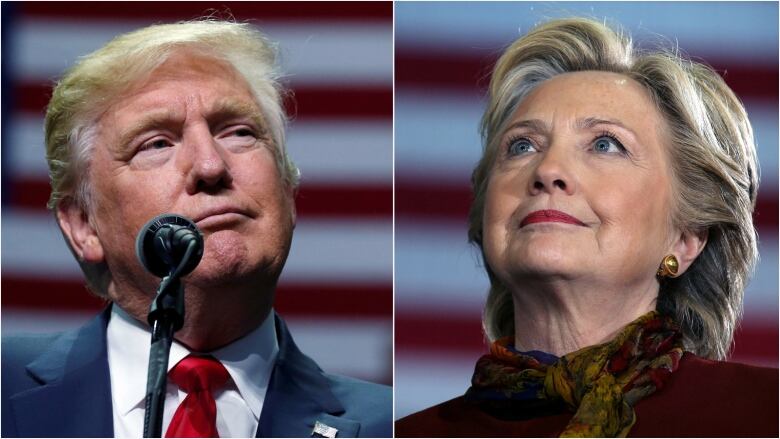Electing Donald Trump was America's way of lashing out

It's late August, 2016, in Dover, New Hampshire. It's a sunny day, and two Canadians are volunteering for Democratic presidential nominee Hillary Clinton. We approach a shirtless man in his driveway as he washes his pickup truck.
We make our pitch. He listens, a sour look on his face. He shrugs.
"[Donald] Trump is crazy, and he'll start a war," he says. "But she's a crook."
The man, previously a registered Democrat, says he can't vote for Clinton. He won't.
- LIVE BLOG|Follow post-electionnews and commentary
- INTERACTIVE |Election results and what they mean
- ANALYSIS |How Trump defied pundits and pollsters to win the White House
Everywhere the Canadian volunteers go in Dover, it's the same thing: registered Republicans expressing hatred, or something approaching it, for Clinton. Democrats expressing reservations, and sometimes actual anger, about the Clintons' riches.
She was ahead in the polls. The pundits said she'd win. She had more money. She was better organized. She had the right messages. He was over and over shown to be a dishonest, sexist, racist man who was utterly unfit for any office, let alone the highest one.
So what happened?
Oftentimes in politics, the truth is right there in plain view.It certainly was that August day in Dover. The truth, unpleasant as it is, has 10 points:
1. The media wereTrump's best friend
Scribes dutifully documented every one of his foul utterances, giving him far more coverage than any of his Republican opponents in the primaries and, later on, Clinton. He played them like a proverbial fiddle. They went along with it for ratings.
2. He took risks, she didn't
Voters know when a politician is playing it safe, and they don't approve. Middle America didn't support every single thing that Trump had to say, but they heard him, loud and clear. They knew where he stood. With Clinton, they too often felt they didn't.

3. Campaigns don't matter
The accepted wisdom, in political circles, has always been that "campaigns matter."Run clever ads, conduct focus groups, give stirring speeches, stay within the lines. Trump didn't do any of that. He like his Canadian beta, former mayor Rob Ford made a virtue out of looking and being disorganized.He couldn't hope to replicate Clinton's campaign organization, so he shrugged and shined a light on that. Voters approved.
4. Sexism played a part
We all heard that, plenty of times. We saw plenty of evidence, too. But it's a criticism that will only work if most Americans were ready to see a woman in the Oval Office. Incredibly, appallingly, they still aren't.
5. Racism did too
(See sexism, above.) The president-elect is racist, sure. But so too are many Americans. Trump knew it.
6. Change trumps the status quo
Election night exit polls can be unreliable, but not this time: when the people say they want something different, very little will change their minds. Trump represented radical change, sure. But he was assuredly a change. Clinton, meanwhile, roped herself to the deck that is the legacy of outgoing president Barack Obama, and her husband, and the D.C. establishment. And she went down with that ship.

7. Fear often trumps hope
In any campaign, there are two buttons to push: hope and fear.Clinton was the former, Trump was the latter. She went high in first lady Michelle Obama's famous formulation and he always went low. Nobody will ever admit to a pollster that they are motivated by the so-called "negative" stuff, sure. But, in dangerous and uncertain times, "going neg" works.
8. Sanders supporters kept away
Would-be Democratic nominee Bernie Sanders giddily smeared Clinton throughout the primaries, branding her as the stooge of Wall Street. And then, when she won her party's nomination, he did a whiplash-inducing about-face and started singing her praises. He expected his millennial army to sing along. They didn't. They believed him the first time around, but later kept away from Clinton.
9. In dangerous times, Americans don't want 'dialogue'
They want a strong man. The same thing happened in 2004: Americans knew that George W. Bush probably wasn't smarter or more accomplished than his Democratic rival, John Kerry, but they didn't care. After 9/11, voters wanted someone to crush America's enemies, not have a conversation with them. With ISIS "lone wolves" now striking the American homeland in places like Boston, San Bernardino and Orlando, they want Trump to do likewise.
10. Democrats underestimated the anger
At those doors in Dover back in August, we saw it over and over. We heard it. Americans were so, so angry. They wanted to lash out.
They did.
- Hillary Clinton says Americans owe Donald Trump 'an open mind'
- ANALYSIS: How Trump defied pundits and pollsters to win the White House
This column is part of CBC's newOpinion section.For more information about this section, please read thiseditor'sblogandourFAQ.












_(720p).jpg)


 OFFICIAL HD MUSIC VIDEO.jpg)
.jpg)



























































































